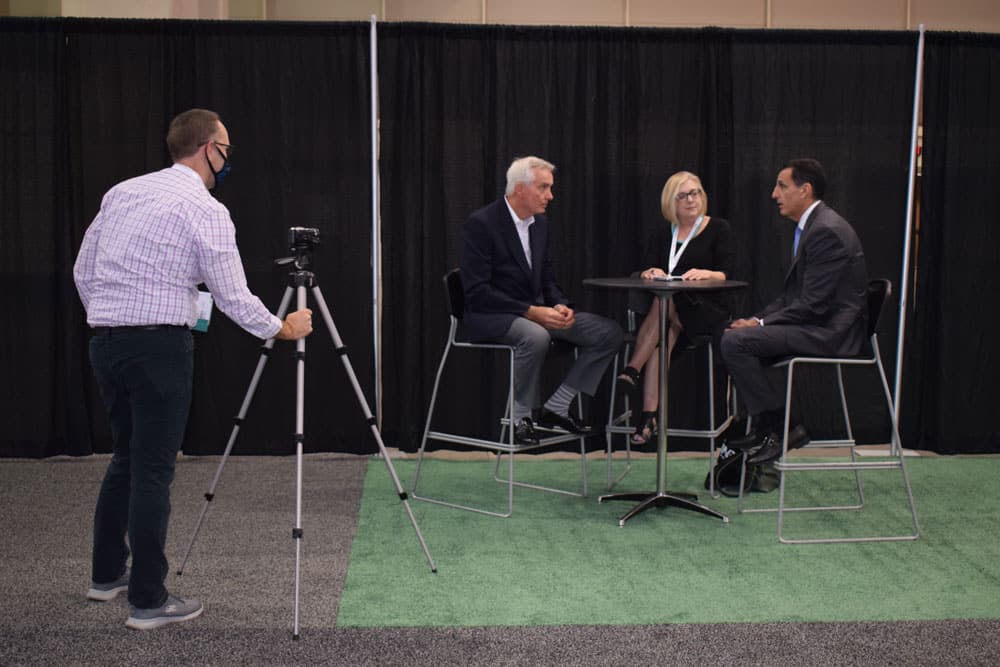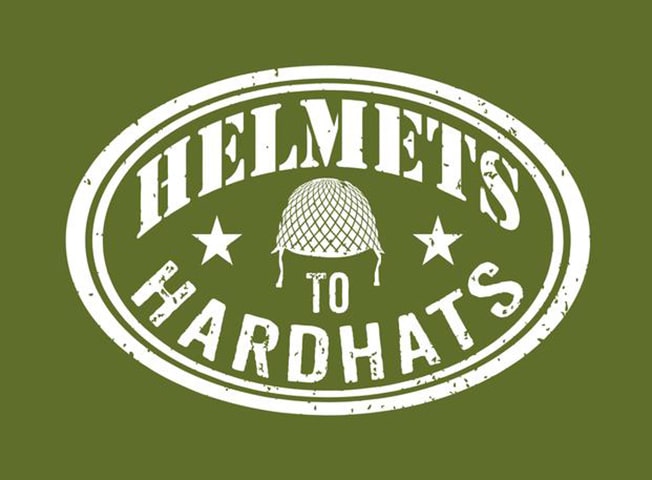NYC’s TEI Group finds success with Helmets to Hardhats program.
During the National Association of Elevator Contractors (NAEC) 72nd Annual Convention & Exposition in New Orleans in October 2021, your author (KW) sat down with Michael Staub (MS), executive vice president, operations, and Ray Downs (RD), senior vice president, environmental health and safety, at NYC-based TEI Group, to hear about the Helmets to Hardhats program (H2H) for a video interview for the ELEVATOR WORLD Podcast. TEI has been participating in H2H, a national, nonprofit program that connects transitioning active-duty military service members, veterans, National Guard and reservists with skilled training and career opportunities in the construction industry, for nearly 20 years. Staub and Downs took the time to speak with your author about the program and the larger training and education picture.
KW: In a nutshell, what is H2H?
MS: The program recruits ex-military or people who are transitioning into civilian life to successful, potentially lucrative careers in trades such as elevators.
KW: How did TEI Group connect with H2H, and how did it come about in NYC?
“[TEI Group President Mark Gregorio] always pushed for CE and always strived to have the best people in the industry working for TEI Group.”
— TEI Group Executive Vice President, Operations, Michael Staub
MS: Gary Labarbera, president of Building and Construction Trades Council of Greater New York, was the one to actually start the program in NYC. He started getting other union construction trades onboard, such as International Union of Elevator Constructors (IUEC) Local 1. Lenny Legotte, the current president of IUEC Local 1, is a veteran of the U.S. Marine Corps. He got involved with it and asked some of the signatories to get involved, as well. [Legotte] spoke with TEI Group President Mark Gregorio about it, and he was onboard 100%. We’ve been participating in H2H since 2003, and it’s been very successful for us. These men and women with their military background come prepared to follow standard work processes that our trade requires, allowing them to adapt and become part of our industry’s workforce. Their skillsets may already include mechanical or analytical abilities, making it easier for them to join our trade.
KW: In which ways are they prepared?
RD: A military background is more regimented and disciplined than others. In the elevator industry, we require the same discipline to follow standard work procedures, just like they do in the military.
With someone coming from the military, the discipline is critical for them to follow industry policy and safe work procedures. That allows them to learn and grow. When given direction you will usually hear, “Yes, sir, and copy that,” because that is what they say all the time in respect to their management and the company.
KW: So they are not trained specifically in elevators, but they have a basic skillset.
MS: That’s right. They’re great with teamwork and punctuality. Some of them do come to us with certain technical training and skills. Many were mechanics or welders in the military, for example, and we utilize those skills in the elevator trade. They become very dependable, reliable employees.
KW: I know TEI is a union shop. Did you guys visit the National Elevator Industry Education Program (NEIEP) National Training Center that opened recently in Warwick, Rhode Island (EW, November 2021)?
MS: We haven’t visited yet, but will definitely support it in any way possible. We are unique in New York, though. New York has a state-of-the-art training facility at Local 1 union hall that is administered by NEIEP in Long Island City (LIC) and another location in New Jersey that includes hands-on and classroom training. Like the new Rhode Island training center, they have a number of pods set up with simulators for hydraulics, door operators and the components that make up an elevator’s complex system that we maintain and install today.
Additionally, classes are offered in welding and electronics to the apprentice, as well as the experienced mechanic, to enhance their skillset. So, a lot of training goes on at the union’s LIC facility that cannot be duplicated throughout the rest of the country. We use both the union’s LIC and New Jersey training facilities just because of their proximity and the volume of work we have. But we will definitely be involved in some form or fashion with the new NEIEP National Training Center.
RD: NEIEP’s training is phenomenal. It’s overseen by Richie Loeb for the NYC area. He’s very involved in the day-to-day, not only in apprenticeship training — which is excellent — but also in the continuing-education (CE) program where we have technicians who are in the field for a number of years who want to continue to educate and train themselves on the new equipment. The NEIEP training program is spectacular, and we are going to continue to support it.
RD: The union mentoring program also brings in consultants and safety professionals like myself to talk in front of the apprentices. We discuss safety processes and safe work procedures. These classes provide an opportunity for trainees to meet in huddles, and discuss their roles and jobs with a mentor. This program allows for an open dialogue not just with H2H candidates, but all apprentices working in our industry from Local 1. When we hire apprentices, we also train them on the Nine Safety Absolutes, and this acts as reinforcement training.
KW: Approximately how many full-time employees has TEI gained through H2H?
RD: Roughly 10% of our workforce has come to us through the program. It’s a great transition from the military into the elevator trade. It’s been a success since 2003. We’re going to continue and hopefully give these young men and women who served in our military the opportunity to get into the best trade in the country, if not the world.
“They come to us ready to work, and work hard.” — TEI Group Senior Vice President, Environmental Health and Safety Ray Downs
We also have managers who are from H2H, so it’s not just a field-oriented opportunity.

KW: How much can one of these trainees/graduates potentially earn?
MS: The pay scale is union-based and, every year, goes through the union hierarchy, apprentice all the way up to a mechanic. It is under a collective bargaining agreement, rate-of-scale pay. As they get further into their careers, it’s a good compensation package. Potential earning capabilities are endless. The trade provides great retirement and great medical benefits. Local 1 leadership has really done a magnificent job in making sure the young men and women who are in our trade are supported.
[Gregorio], the president of our company, is very big on education. We like to say, pound for pound, we have the strongest workforce in the industry, and we’ll continue to. He’s always pushed for CE and always strived to have the best people in the industry working for TEI Group.RD: Internally, we do about 24 hours of education and training per employee per year. So we don’t just stop at the union. We also, as a company, train our employees on the Nine Safety Absolutes that are prominently displayed in the Elevator Industry Field Employees’ Safety Handbook.
KW: You guys keep mentioning young people. Are people who come out of H2H always younger people or are there some older soldiers as well?
RD: Age doesn’t matter with us. We’ll give anyone we feel is qualified an opportunity to work in our trade.
KW: How would you say this program differs from other recruitment programs in the industry?
MS: What makes it different is that the participants are
prepared and ready to go. They have discipline from the military, and it allows us to teach them. They follow directions and processes. In other areas, they have to learn that discipline. And that’s where I think the biggest concern is — when we have new employees we’ve got to start them from scratch. With H2H, they’ve already got that basic foundation.
RD: They have leadership qualities. If you want a well-run, successful company, you hire leaders. So we’ve been very fortunate that we’ve had a lot of H2H people come aboard and work with TEI.
KW: What are some individual H2H success stories?
RD: We do have some very good H2H success stories. Danny Kirk is one of our estimators and has been with us for I don’t even know how many years. Frank Pugliese is our maintenance supervisor and a U.S. Marine Corps veteran. We have a couple of veterans who fought in Afghanistan, like Chris Brock, one of our new construction foremen. He recently handled an installation at a beautiful tower in Hunters Point South in LIC. Bobby Bragdon, field maintenance mechanic, has been a phenomenal employee for 20 years. Lastly, Joe DiCicco, who was a Navy guy, just retired and moved to Massachusetts (EW, September 2021). He was located at our Google building at 111 8th Avenue in NYC.
When H2H men and women inquire about an opportunity to get into the elevator trades, we are sold on giving them that opportunity. It is that big of a deal at TEI Group.
Get more of Elevator World. Sign up for our free e-newsletter.










